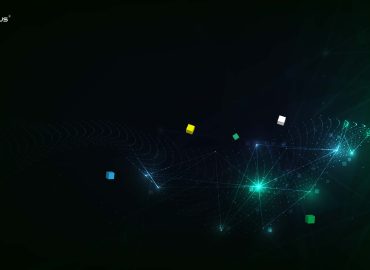Metaverse came to light back in 2021 when Facebook rebranded itself to Meta. But in reality, the phrase “Metaverse” dates way back to 1992, when Neal Stephenson mentioned it in his book Snow Crash. So it has been a long way, and various technological advancements have been involved in what you can call and see as the Metaverse today.
The core idea of Metaverse is to provide interoperability, transparency, decentralization, and ownership rights and to combine the real world with the virtual world. And in this way, it ensures a superior experience for customers from the comfort of their couch. Moreover, as Metaverse has such great benefits, various industries are taking advantage of it. But the E-commerce industry is leading the race.
Thus, in this article, we will cover everything around Metaverse Commerce and see if Metaverse can truly change E-commerce forever. So let’s get started.
What actually is Metaverse?
At its core, Metaverse combines two words: “Meta” and “Verse.” This means “Beyond the universe.” Thus, Metaverse is a 3D virtual world that is computer generated, but it closely resembles the real world. The main aim here is to bridge the broad gap between real and virtual work and let users have an experience beyond their imagination.
However, it should be noted that Metaverse is not a standalone technology; instead, it works in collaboration with various other edge-cutting technologies like:
- Blockchain Technology
- Non-Fungible Tokens (NFTs)
- Artificial Intelligence (AI)
- Machine Learning (ML)
- Augmented Reality (AR)
- Virtual Reality (VR)
Thus, with the help of such strong technology backing, Metaverse is making it possible for users to virtually experience physical shopping in a 3D virtual space. And there is no restriction on time and geography; this is just amazing and mind-blowing.
How will Metaverse change E-commerce?
There are various ways in which Metaverse will strongly impact the e-commerce industry. So let’s have a look at some of the most prominent ones.
- Building a Strong Community Around a Brand
E-commerce and social media have emerged as two of the most widely accepted innovations in the world. And there is no doubt that e-commerce heavily depends on social proof. Whether it’s Amazon and Google reviews or reviews from some of the well-known third-party websites, they all influence consumers’ purchases of products.
But this is one of the most significant issues faced by the e-commerce industry as there is a lack of social connection, transparency, and trustworthiness. And here comes the role of the Metaverse, which connects buyers and sellers directly without anyone standing in between them. Moreover, with NFTs, brands can reward and provide unique access to their most loyal and prominent customers and build a strong community around the brand.
- Merging Offline and Online Shopping Experiences
According to a recent survey by Shopkick, more than 70% of people still love to shop from an offline shop rather than an online E-commerce site. The primary reason given by respondents was that they like to try, feel, and touch the products, which is missing in the 2D E-commerce websites.
So, Metaverse can help the E-commerce industry overcome this issue by merging the offline experience with the convenience of online shopping. Thus, customers no longer need to worry that the product delivered will differ from what they have seen in pictures. And sellers need not worry about customers returning the product.
- Hyper-personal Shopping Experience
Personalization is indeed a secret ladder to success for brands. As per the survey by McKinsey, more than 71% love personalized products from brands, and over 76% hate brands that don’t provide personalization. But in the current e-commerce ecosystem, brands have generalized products and designs for everyone, so it clearly lacks personalization.
But with Metaverse, brands can personalize the experience for their customers. For example, Nike’s Nikeland, a 3D space in the Roblox gaming platform, allows players to buy personalized virtual apparel with the points they have won by playing games.
Thus, with the help of personalization, brands can attract more and more customers and serve them exactly as per their needs. This is a win-win situation for both customers and brands, as customers can get what they want, and brands no longer need to pile up huge stocks and worry about their sales.
- Global Outreach
Currently, some e-commerce platforms are present globally, while others are available locally in a particular country. Thus, brands need to do many things to ensure they are present in every corner of the world. Furthermore, the e-commerce platforms that are globally present have different listings and domains for every country. So even with them, it isn’t possible to list in one place and get visibility worldwide.
Again, Metaverse takes the lead and ensures that brands get global visibility from Day 1. It also allows many features for modifications, customization, and innovations, which can help a brand maintain and showcase itself amazingly on the global stage. This way, customers can shop without hassle from around the world.
- Better Marketing Insights
Proper marketing is one of the most significant factors behind the success of any brand. Brands can effectively cater to their customers’ requirements if they get valuable insights. Although, in recent times, technology companies like Google have made sure that they track every movement of their users so that they can directly provide them with what they need.
But many users have complained that they are unhappy with the 24*7 tracking of their details. And Metaverse seems to be the perfect solution for the same. In the Metaverse, users can hide their real identities and enjoy doing what they want; thus, they won’t care much about tracking as their underlying identity is hidden.
Furthermore, brands can test the results of their insights from Metaverse by selling virtual assets to the targeted customers. This will help them save on the cost of manufacturing the physical asset, and they can even sell both physical and virtual assets by interlinking them; this is like an add-on benefit.
Are big E-commerce giants adopting Metaverse?
E-commerce giants have already started to adopt Metaverse and have also launched their products around it, like:
- Amazon, the world’s biggest e-commerce platform, has launched Room Decorator. Customers can use this AR tool to look at how particular furniture or decorative items will look in their homes or offices. So now, customers can comfortably sit on their couches and order furniture effortlessly.
- Flipkart has also launched Flipkart Labs, which will help the company design blockchain-related solutions and also help explore various use cases of Metaverse. With this launch, it seems clear that Flipkart will adopt Metaverse and soon shift to it.
Not only e-commerce giants but other companies are also scaling themselves in the Metaverse, like:
- Warby Parker, a retail chain for sunglasses, contact lenses, and prescription glasses, has launched a virtual fitting app. With this app, customers can choose anything from the brand’s collection and check whether it suits them well before making a purchase.
- Meta is actively working on Horizon, which will allow users to trade 3D virtual items.
- Microsoft, Gucci, Nike, Google, Adidas, etc., are also on the same track.
Is the future of Metaverse governed E-commerce long-lasting?
Blockchain technology has brought in various new opportunities and technologies, but many of them have even ended up in the graveyard. So can’t Metaverse commerce be on the same list?
Let’s understand the answer to this question with a few statistics:
- As per a survey conducted by Gartner, more than 25% of the world’s population will spend at least one hour every day on Metaverse for shopping, entertainment, gaming, social interaction, and work by 2026.
- According to Future Marketing Insights, the global consumer Metaverse market size is expected to surpass $500 billion by 2032, which means it will grow at a CAGR of 24.5% from 2022-2032.
If these statistics don’t convince you, then let’s understand Metaverse commerce with a hypothetical situation.
You have a meeting with a client in the next 3 hours, and you need to wear a coat for the session. But the twist is that you don’t have one, so what will you do?
If you don’t wear a coat, the client will be upset, and you might lose him. Obviously, after this incident, you will be fired. But wait, the last twist is left; it’s a virtual meeting, so you can buy a brand new coat, shoes, tie, and whatnot in Metaverse and ensure that the client loves your outfit. Finally, don’t forget to prepare for the presentation, or else all your efforts will end up in vain.
Thus, Metaverse seems to change the dynamics of the e-commerce industry by harnessing the power of virtual connectivity.
Prolitus can help you develop a Metaverse powered E-commerce platform
Prolitus is a leading metaverse development company in the Web3 space. Our team is highly experienced and equipped with the skills required to develop a Metaverse-powered e-commerce platform. Thus, whether you have a requirement to set up the entire Metaverse from scratch or you just need to modify the existing platform, we are the best fit for your needs.
Moreover, our service doesn’t end or limit itself to just the platform’s development; instead, it’s the start of our business relations. So we support and take care of any help you might need from us after the platform’s development. Thus, we have the best in industry post-development service. So don’t wait much longer, and let’s start the development of your Metaverse-powered E-commerce platform.
In case you still have any doubts revolving in your mind, don’t worry. Just contact us, and let our experts handle all your doubts.
Final Thoughts
A virtual world is now no longer limited to movies. Instead, it’s right in front of your eyes with the help of augmented reality, virtual reality, and other edge-cutting technologies. Furthermore, Metaverse is about providing consumers a “wow experience” by revolutionizing how they used to interact with brands and make buying decisions.
But, as changes are happening daily in this new world, it can be said that metaverse commerce is still in its early stages. And at this point, it can be compared with the Internet back in the 1970s, when everyone thought it wouldn’t go mainstream. But thankfully, it got global adoption, and now you are reading this article because of it. Similarly, metaverse commerce will also explode in the upcoming years, and the brands that are early adopters will get to enjoy a huge portion of the profits from it.
So don’t wait for your competitors to start the developments in the new Metaverse commerce; instead, you lead the way. And don’t forget to get in touch with Prolitus, as our experts are ready to take all the pain it takes to develop a Metaverse E-commerce platform for you.





